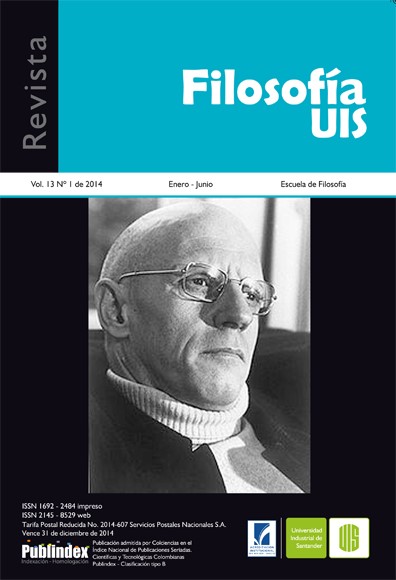Meaning and reference in contemporary art. The case of electronic and digital arts
Published 2014-04-29
Keywords
- Comprehension,
- reference,
- likeness,
- meaning,
- symbol
How to Cite
Copyright (c) 2014 Sandra Lince-Salazar

This work is licensed under a Creative Commons Attribution 4.0 International License.
Abstract
With this text I intend to establish a relationship between the semiotic-hermeneutic ways of making art and the experiential happenings that give rise to artistic productions, including the heirs of science and technology: electronic and digital arts. This will make an analysis of the notion of mimesis, I will argue that we are witnessing a supported art semantic dimension in its reference to the everyday world. For this mention some traditional art and, especially, will stop looking at what is considered the first digital artwork Ninety Parallel Sinusoids by Michael Noll, and in more recent ones Esto no es un Magritte by Uruguayan Fabián Barros, and Esto no es América by Chilean Alfredo Jaar. The three works are chosen in order to analyze their benchmarks. So finally I hope to show that the relationship between man and the world still has ways of representation in art, and that despite all the twists and syntactic changes that can occur, the art is still a way of interpreting the world and what it burden of meaning.
Downloads
References
- Aristóteles (1995). Arte poética. Buenos Aires: Porrúa.
- Eco, U. (1986). Estructura Ausente. Barcelona: Lumen.
- Eco, U. (1991). Obra abierta. Barcelona: Ariel.
- Eco, U. (2000). Tratado de semiótica general. Barcelona: Lumen.
- Gadamer, H. G. (1993). Verdad y método. Salamanca: Sígueme.
- Gadamer, H. G. (1991). Actualidad de lo bello. Barcelona: Paidós.
- Goodman, N. (1976). Los lenguajes del arte. Barcelona: Seix Barral.
- Heidegger, M. (2001). Caminos del bosque. Madrid: Alianza.
- Lomba Fuentes, J. (1987). Principios de filosofía del arte griego. Barcelona: Antrhopos.
- Marchán Fiz, S. (2001). Del arte objetual al arte de concepto. Madrid: Akal.
- Ortega y Gasset, J. (1960). La deshumanización del arte. Madrid: Revista de Occidente.
- Platón (1993). La República. Barcelona: Altaya.
- Plotino (1967). Enéada quinta. Buenos Aires: Aguilar.
- CIBERGRAFÍA
- Barros, F. (s. f.). Esto no es un Magritte. MUVA, Museo Virtual de Artes. Disponible en: http://muva.elpais.com.uy/flash/muva.htm?&lang=sp (Consultado el 13 de marzo de 2013).
- Jaar, A. (2004). Love art not people. Disponible en: http://www.loveartnotpeople. com/2013/04/why-i-cancelled-my-trip-to-55th-enice.html#.UZRnpKJg9ic (Consultado el 12 de abril de 2013).
- Noll, M. (s.f.). Ninety Parallel Sine. Digital Art Museum. Disponible en: http:// digitalartmuseum.org/noll/artworks_01.htm (Consultado el 9 de marzo de 2013).
